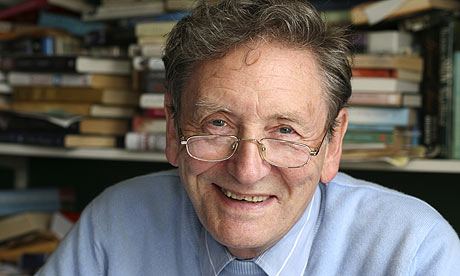
Forty-two years after his wife Margaret Drabble won the James Tait Black Memorial award, Michael Holroyd has followed in her footsteps and landed the biography prize.
"I'm in good company, if a little far behind," said Holroyd, who was awarded the £10,000 biography prize for his book about 19th-century Shakespearean actors, A Strange Eventful History. The win is especially poignant for Holroyd, as Lytton Strachey – the subject of the book which established Holroyd as one of the UK's foremost biographers in 1967 – also took the James Tait Black, Britain's oldest literary award, in 1921. Drabble won the fiction prize in 1967 for her novel Jerusalem the Golden.
Written over a period of seven years, while Holroyd was suffering from bowel cancer, his book tells of the lives of the actors Ellen Terry and Henry Irving and their families. The latter include a daughter, Edy Craig, who founded a feminist theatre group and established a lesbian community, and a son, Edward Gordon Craig, who had 13 children by eight women. "Whenever I could escape from the sick room, I used to immerse myself in another world, of actors in the Edwardian age," Holroyd said. "I hoped that need to get away from sickness and enter another world would give the writing an additional intensity. It was a magic carpet, and I was the time traveller."
Each time he was forced to leave the book and return to hospital, he would write himself a letter to remind him of the stage he'd reached. "My writing was so bad I could hardly work it out, but I got there in the end," said Holroyd, who is about to send the draft of his next biography, Illegitimate Daughters, looking at the lives of a clutch of very little-known women, to his publisher Chatto. Joining Peter Ackroyd, Claire Tomalin, Antonia Fraser and Vita's cousin Edward Sackville-West on the list of James Tait Black winners was, he said, a "very pleasant feeling". "It's something different for me, as I'm usually not a prize-winning author but a prize-giving author. I've judged so many prizes so to be in this role is very nice," he said.
The shortlists for the award, which celebrates its 90th anniversary this year, are compiled by academics and students at the University of Edinburgh. Professor Laura Marcus, who judged the biography prize, said that Holroyd's winning book was a "worthy addition" to the James Tait Black's roster of former winners, which includes DH Lawrence, EM Forster and Graham Greene. "He achieved something which is very difficult to do, bringing alive Terry and Irving," she said.
Sebastian Barry, who won the Costa prize for his story of an aged mental patient and her psychiatrist, The Secret Scripture, took the novel prize at this evening's Edinburgh international book festival award ceremony. Barry saw off competition from authors including Nobel laureate Toni Morrison and Mohammed Hanif, whose debut A Case of Exploding Mangoes won the Commonwealth first book prize.
Barry said that winning the £10,000 award was "a signal moment of unalloyed joy". "Roseanne says in The Secret Scripture that we have to itemise our happiness – when you get a moment, be sure you embrace it. I'm definitely embracing this one," he said. "When you look at that list [of former winners], Arnold Bennett won it in 1923 – when I was first married 25 years ago one of the first things I read out in bed with my wife was Arnold Bennett. It has the feeling of being a classical prize, and it feels like there's a mystical telephone line back so maybe you could ring up Arnold and he'd tell you how happy he was then. And DH Lawrence won it, for God's sake."
Rosalind Belben won last year's fiction prize for Our Horses in Egypt, while Rosemary Hill won the biography award for her life of Augustus Pugin, God's Architect.

